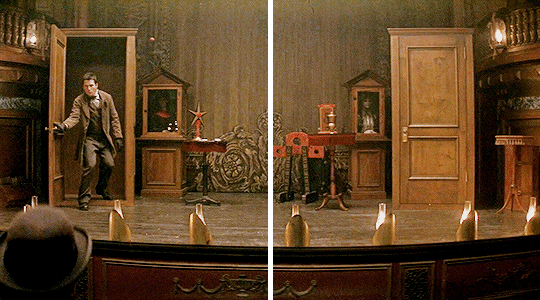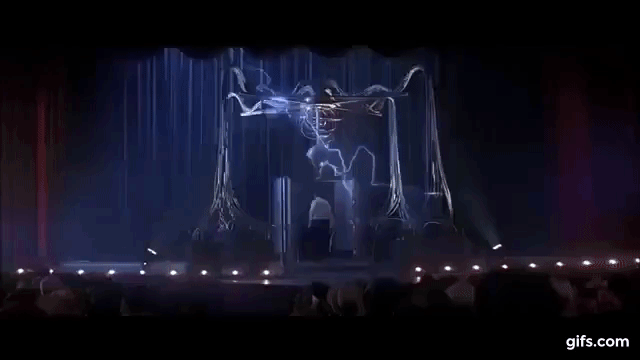Dennis Hackethal’s Blog
My blog about philosophy, coding, and anything else that interests me.
Why Doesn't Angier Use the Machine Only Once?
This post is about the 2006 film The Prestige. Major spoilers ahead. Familiarity with the movie is assumed, but I do refresh the reader's memory some.
The Prestige is one of my favorite movies. Every couple of years I watch it again and notice something new. I did so the other day, and this time, I asked myself: why doesn't Angier use Tesla's machine only once?
As you may recall, Angier is obsessed with coming up with a better version of 'the transported man', a trick his rival Alfred Borden has come up with:

Source – Ignore the white line in the middle.
First, Angier tries using a double, but due to Borden's influence, that doesn't work out too well: the double blackmails Angier. He also ends up with a broken leg. Not only can he clearly not work with a double and has to find another way, but he's also dissatisfied with that approach: he doesn't think Borden uses a double, so why should he?
Upon Borden's misdirection, Angier travels to America to meet the famous scientist Nikola Tesla – whom some in the profession consider a real magician, a wizard, because he can actually do what magicians merely pretend to do, as Angier's engineer says later on. Angier has to wait for a long time and spend a lot of money on the project, but Tesla finally delivers a replication machine to him. It can clone any object placed inside of it, alive or not; the clone then appears some distance away with the original still intact. If the original is immediately hidden, it looks like instant transportation, thereby duplicating (no pun intended) Borden's trick.
Angier uses this machine to perform what he calls 'the real transported man': by stepping inside the machine, he can clone himself and make the clone appear on the other side of the theater. But the original Angier kills himself during every performance by drowning himself in a water tank. Right after the duplication is finished, a trap door opens:

Angier is then dropped into the water tank placed underneath the stage, and the tank locks immediately. It's a cruel reference to how his wife died in an accident caused by Borden – the event early on in the movie that started the rivalry between Borden and Angier as well as Angier's obsession with outdoing and getting back at him.
That brings me back to my question. Why doesn't Angier just clone himself once to avoid killing himself over and over? All he needs is a double he can trust. Surely he can trust himself? Repeat suicide seems like a heavy-handed way of performing the trick at best; the method itself doesn't actually require it. Instead of falling to his death, he could fall on a mattress, and then his clone, already hiding where he would appear to have been 'transported', could reveal himself to the audience shortly thereafter.
Some have suggested that "[h]e [couldn't] share, even with himself". Maybe – it is true that he is filled with bitterness. Others have said that he avoided using a clone as a double due to the power that such a double can have over him – recall the blackmail incident. But would he really rather die than trust a copy of himself? If anyone is trustworthy, surely it's oneself. There's also the idea that "[t]he plot with Borden's wife pretty well establishes how untenable it is for two identical men to take turns living the same life". But when he decides how to perform the trick, Angier doesn't even know yet that Borden has a twin. Lastly, Angier never liked the idea of using a double – he thought it was too simple, and, like I said, he doesn't think Borden uses one. But again, is that worth dying every night? Surely not.
I could be wrong, but I'm not sure Angier ever fully understands what exactly the machine does. While still with Tesla, he sees that it successfully clones his top hat many times and even a cat. Yet the first time he steps into the machine himself, he seems utterly surprised to find his clone standing a few feet away from him shortly after – and, if you recall, ends up shooting him in a state of shock. In addition, he says at the end of the film that he never knew whether he'd be "the man in the box" or the lucky one who comes out the other side. He seems to think that there's something of a 50/50 chance of coming out alive after each performance. But that's not the case. He, the Angier who's about to use the machine, always drops into the water tank and dies. And his clone always survives. The Angier we see toward the end of the movie is a clone of a clone of a clone..., but he seems to take himself for the original.
One might suggest that Angier has such a dislike for being "the man in the box" that he doesn't want to take turns with a clone – turns in the sense that sometimes he would end up below stage (safely), sometimes his clone would (also safely). But even that preference doesn't make sense compared to certain death.
Maybe it's his mistaken belief that there's only a risk of death, rather than certain death, that causes him to prefer such a risk over trusting a single, live clone who might betray him. But that still sounds far-fetched to me: taking turns would seem preferable to a one-percent chance of dying, let alone a 50/50 chance. And think of the implications: after each performance, his stagehands have to remove the water tank containing his dead counterpart from the theater, and they are all blind because he does not trust them. What if something goes wrong? What if one day, they make a mistake, the tank falls and spills for everyone to see? Then people will think he killed a double unless he reveals how his trick works, which he'd never want to do. Eventually something has to go wrong. Maybe that's why he plans to do only 100 performances.
Somehow he thinks this great risk is worth it. But why?
The most satisfying answer I have found is this one: since Angier wants to frame Borden for his murder, and since he doesn't know when Borden will show up to his performance, "he need[s] a fresh body in the tank every night". He is willing to kill himself during every performance – or, as he thinks, risk killing himself – just to get back at Borden. He'd rather 'risk' reliving his wife's tragic death over and over than get on with his life.
What a mess.
What people are saying
Agreed. That is the best scenario as to why Angier sets up Borden and also if he had not torn up the note from Borden he may have spared himself all the trouble but his mind was so twisted with grief and bent on revenge against Borden that he not only took away his freedom but his daughter he truly became the worst version of himself which was why he was able to dispose of himself every time.
Reply
Now about which Borden twin survives!
Reply